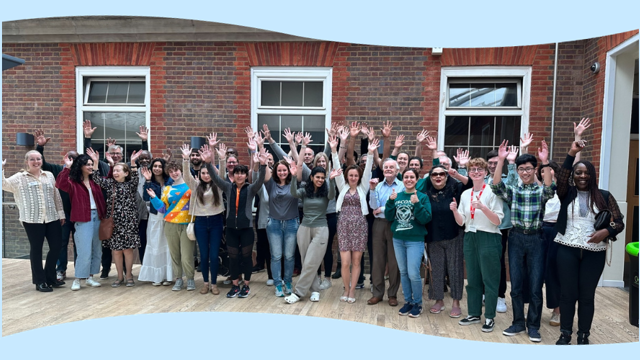Over the last year, we’ve supported innovative projects powered by community efforts that are focused on addressing climate change. From a climate assembly in Blackpool, transitioning to sustainable transport in the West of England and the implementation of a zero-emission zone in Oxford, amongst others. In each of these projects, we’ve had the opportunity to engage directly with communities. An overwhelming majority of citizens believe we must make change happen now before we see an irreversible impact.
A desire for change
In the latest report on public attitudes by the Department of Business, Energy and Industrial Strategy, 92% of citizens have changed their behaviours in some way.
Citizens are enthusiastically changing the way they live, making more climate-conscious choices. Most commonly we’ve seen this through walking and cycling over using cars, recycling and switching to clean energy providers. We’ve also seen a rise in financially stable citizens retrofitting their homes with more insulation, double glazing and solar panels.
But to continue working towards making a bigger impact across our places, we need to understand the barriers that are stopping people and organisations from taking further action against climate change and what role local government can play in engaging effectively to support citizens through this crucial phase.
Building stronger partnerships
One of the ways citizens can get further involved in climate action is through voluntary and community groups in their area. Yet stronger relationships between these organisations and local authorities are required. Through clearer communication channels, the promotion of groups across places and effective partnerships, councils can support these groups to have a wider reach.
Across the UK, there’s been a wide range of organisations providing a broad set of services and activities focused on the climate crisis. From education, campaigning on climate-related issues and organising community-led climate action, such as energy co-ops and community growing schemes. We’ve already seen strong collaborative activities in this space, such as workshops that spoke enthusiastically to the climate assembly in Blackpool. Sharing with citizens local actions that can be easily adopted in communities, such as borrowing instead of buying items they need, like outdoor, domestic and cooking equipment.
Policies in the climate era
What is clear is that collectively, citizens and communities want to do even more. However, they feel there’s a limit to what they can do by themselves. To make it easier for communities to reduce their emissions, the public sector must begin to engage with them to identify what challenges people face in their local place, these often include:
- not purchasing electric vehicles because the infrastructure isn’t in place
- limited changes to buildings because planning restrictions won’t allow it
- not organising community action because they don’t have the knowledge or skills
- not knowing what to do or how to do it, because of a lack of information
Insight around these concerns can be used to transform services and design policies that truly work for citizens in the climate era. So, whilst communities are passionate about taking more action, there’s a sense that too much of the responsibility is placed on the individual to change, rather than initiatives from central and local governments. Communities would like to see more change sparked by policy, but crucially, policy that has been shaped by communities themselves.
Designing places with purpose
Local infrastructure and citizen safety are common concerns for our communities, preventing people from choosing more sustainable transport options. New cycling routes, places to store bikes and schemes to purchase bikes affordably are a starting point.
There’s also currently a lack of financial incentives to make home improvements, citizens want to have more energy-efficient homes but the outright personal cost outweighs the benefits. If new developments have these improvements as standard due to planning regulations, existing homeowners and those living in social housing will be able to transition too, because planning restrictions won’t get in the way, and there’ll be a range of grants making transition affordable to all.
Supporting citizens by sharing knowledge
For those who want to make a change, but don’t know how there’s a lack of easy access to relevant and practical information. There are challenges in awareness, knowledge, understanding and access to expertise on the issues and how to take action, both on a personal level and in general across all levels of society.
Communities need access to information on local initiatives, the impact of different actions and proportion contributions to emissions, recycling, meat consumption, plastics and microplastics, sequence of enacting policies, fuel, batteries and funding. This information should be available to communities and policymakers.
Local authorities can engage with communities to understand what information they want to find out and the best ways of communicating with them. This knowledge will support people to get involved in a wide range of community-led climate action activities, including local tree planting schemes, clothes swapping events and using the waste from supermarkets and restaurants to run community food projects.
Taking a leading role
Messages from our citizens are clear, they’re up for the challenge and want to work with the public sector to take action against the climate crisis. If local government follows its history of collaborating with communities, we stand a much better chance of achieving the goals of the Paris Climate Agreement and avoiding the most devastating impacts of climate change.
It’s up to our government and public sector to take a leading role in the next steps. Many have declared a climate emergency, defined their action plan and are beginning to take measures. Empowering our communities to support these actions is the next logical step in improving public services, restoring local pride and ultimately levelling up our places for future generations in the climate era.

Transforming the environment
We work with organisations to create data-led policies and products that meet the needs of people, place and planet.
Work with us
Community, collaboration and the climate crisis
In 2019, Oxford City Council declared a climate emergency. Building on the significant work Oxford and the sustainability team has been doing, we’ve recently been supporting their collaboration with local businesses to define a sense of place and purpose, together.
Read moreOur recent insights
Transformation is for everyone. We love sharing our thoughts, approaches, learning and research all gained from the work we do.

Empowering communities: the impact of citizens' assemblies
We spoke to Ellen Jennings, Senior Workstream Coordinator at Barnet Council’s Sustainability Team, about the importance of citizens' assemblies in helping to address the climate emergency.
Read more
Bringing community power to life
Our Community & Political Engagement Director, Claire Hazelgrove, shares her experiences from Stronger Things
Read more
To make change at a national scale, we need a hyper-local approach
Why tailoring services to the needs of local people and places results in much greater impact.
Read more

